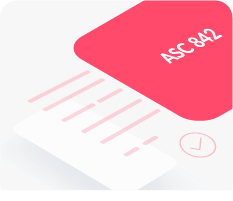
Make your lease accounting audit easier
By
EZLease team
No one looks forward to an audit, especially when you’re taking on new responsibilities like lease accounting. What’s the best way to have a smooth audit? In short, your records need to be complete and accurate with the right controls. There are certain things your auditor needs that can make the audit faster if you’re prepared. In this article, we are going to explain initial compliance and disclosure requirements, preparing for that audit, where to find your lease and data elements, and the role technology plays in simplifying your process. No matter which standard matters for you (ASC 842, GASB 87, GASB 96, or IFRS 16), the right preparation can help your audit go smoothly.
Preparing for a faster audit
When you’re preparing your documents and data for audit, it’s important to have everything organized and ready for the auditor. The auditor is going to check for completeness and accuracy across all of your processes and accounting. They’ll be checking that expenses are correct and meet the terms of all your agreements, including leases.
To get ready, it’s important to take inventory of all your leases. Make sure you’ve captured the key data fields like start and end dates, payment schedule, interest rates (and how you calculated them), and the present value of future lease payments. Make sure to have copies of the contracts and agreements, too. Be prepared to talk through your policies and procedures and how decisions are made, like around the capitalization threshold. Having documentation ready to go will streamline the audit.
Accurate lease data is critical
We’ll say it again. Accurate data is critical. What data will you need?
- Lease terms
- Fixed and variable payments
- Commencement dates
- Purchase and/or renewal options
- Residual value guarantees
- Economic life
- Fair market value
- Lease incentives
Documenting your IBR
Your auditor will want to know how you figured your interest rate or your Incremental Borrowing Rate (IBR). You have several options:
- Use the explicit rate in the contract
- Use the rate implicit in the lease whenever that rate is readily determinable
- Private companies have an option of a “risk-free rate”. Ask yourself what rate would a financial institution charge you to buy the asset?
- Look at your current loan book – are there any notes for similar assets and terms?
- Talk to your banker – what are the current rates for owner occupied real estate, asset-based lending, etc.?
- Talk to multiple bankers – build out a rate sheet.
Choose the method that works best for your business and document that decision so you can share the process with your auditors.
Accounting meets auditing
Showing your work to your auditor can be a bit nerve wracking. But, it doesn’t have to be. Lessees and lessors can make this a seamless process.
For lessees, you’ll start with sharing your journal entries which will help establish your right-of-use (ROU) assets, lease liabilities, and amortization schedules. Lessors will need the schedules for lease receivables and what deferrals are being made. When your disclosures are formatted properly with all the details you need, the audit is smooth sailing.
Using technology to your advantage
Let’s be honest, spreadsheets are time-consuming and risky, even though almost everyone starts out using them (check out Confessions of a Spreadsheet Martyr). The manual reporting takes a lot of time and there’s no centralized database or critical date notifications or validation which creates more risk.
The right technology, like EZLease, will help you keep your data organized and ready for compliance audit at the push of a button. When you use technology, you have automatic validators to verify the lease data input and mapping to GL accounts. The reports that your auditors need are generated automatically by the system so you have output you can trust.
Everything is streamlined. Audits become less of a process, because you’ve got this covered!
The bottom line
The accuracy of accounting records is critical for an auditor and this is especially true when it comes to lease information. Your auditor wants to see accurate and complete lease accounting data, and you can achieve this with an understanding of what an auditor needs and by using the right software solution. To get an auditor’s perspective on this, listen to this webinar replay.
Or, see how easy it is to manage your lease accounting with a trial of EZLease.



